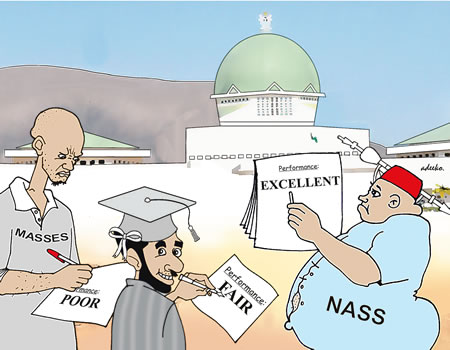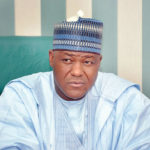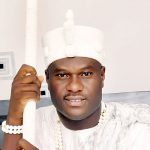Two years ago, the Eighth National Assembly kicked off on a shaky note with the emergence of a leadership that was not supported by the ruling All Progressives Congress (APC). From that antagonistic point, the two chambers soldiered on and two years on, the paradigms have changed. What is really happening in the chambers? Associate Editor, Taiwo Adisa reports:
KASHIMAWO (let’s wait and see). That was the posture of the ruling All Progressives Congress (APC) when the current leadership of the Senate and the House of Representatives emerged on June 9, 2015. The prognosis from the party concerning the election of the Senate President, his Deputy and the Speaker and Deputy Speaker was completely different from the eventual results as Dr. Bukola Saraki and Speaker Yakubu Dogara emerged President of the Senate and Speaker of the House of Representatives respectively.
The party fought back in trying to establish its authority. The National Chairman indeed handed down a list of Principal Officers who he expected to be named in the Senate and the House of Representatives. But that created another round of crisis. The presiding
officers have in recent years created a convention of not taking such directives from the party or reading such letters from political parties. So, while the Senate flatly rejected the letter, the House went about it by adopting a political solution.
The time devoted to the bickering between the party and the leadership of the National Assembly created further gulf between the executive and the legislature as well as the parent party. The end product is what was to later emerge as “government within government;” whereby the arms of government were completely operating at loggerheads.
It also saw to the fact that the ruling party, which should be the store house of the manifesto and policies could not rally its caucus in the legislature until almost two years in the saddle.
The result of all that was that executive/legislature relationship was on autopilot and not a few Nigerians identified the incongruence. Some termed the situation as infighting between the two arms while others concluded that it was a result of the legislature fighting the anti-graft war of the executive.
One thing you cannot accuse the legislators of however is inaction. At every stage, notwithstanding public perception, the lawmakers have always taken one step or the other and that in a way has given it a measure of independence. While a section of the polity holds the view that the legislature is not supporting the anti-graft war of the executive, the lawmakers have designed their own way of joining the battlegrounds. In several instances, they have exposed agents of the executive accused of monumental frauds through their series of investigative and public hearings. They have raised the alarm on suspected underhand dealings in several sectors of the economy including the oil sector and a report of the lawmakers actually led to the suspension of the Secretary to the Government of the Federation, Engineer David Babachir Lawal. The accusations may still be rife, a number of political stakeholders may view them with suspicion, but certainly, inaction is not the word for these set of lawmakers. How really has the chambers feared? That is a question we answer in a moment.
Senate: The journey so far under Saraki
Section 4 (1, 2, 3, 4, 5) of the 1999 Constitution (as amended) establishes the powers of the legislature and vests same in the National Assembly. The Constitution empowers the National Assembly to make laws for peace, order and good governance of the federation or any part thereof.
In the light of that, the two chambers of the National Assembly, the Senate and the House of Representatives have taken up the functions as they exercise the powers of legislation, oversight and investigations.
In a way, the task could amount to standing between the devil and the deep blue sea. If they do it well, they receive applause from the people but kicks from the brother arms of the government who could get badly hurt in the process.
There is no doubting the fact that the 8th Senate under the Bukola Saraki Senate Presidency set out on a murky terrain. But the Senate President moved fast to define the chamber in three broad terms. One, it wants to be seen as helping to deepen the fight against corruption; promote and patronise made in Nigeria goods and help stabilise the economy.
But the nature of politics at play in Abuja made it difficult to immediately locate the focus of the Saraki Senate. Less than three months into his tenure, the, the Federal Government unveiled a suit bordering on improper asset declaration against him at the Code of Conduct Tribunal (CCT). That suit is still subsisting at the Tribunal right now. At the start, many found it difficult to distinguish Saraki’s politics from the decisions of the Red Chamber. Where the chamber became antagonistic, it was an instance of the Senate President fighting back and where the chamber became complacent, it could be another instance of the presiding officer seeking soft landing.
Two years in the saddle, the polity has however grown used to seeing the face of Saraki and possible accepting his Senate Presidency as a reality.
Wadding through murky waters of politics
In 2015, Saraki rode on his popularity among the Senators of the APC and opposition Peoples Democratic Party (PDP) to become the Senate President while Senator Ike Ekweremadu of the PDP also got elected the Deputy Senate President. Still riding on majority voice in the chamber, Saraki rejected the advice of the leadership of the APC which proposed some names as Principal Officers. That was to flag off series of intra-Senate squabbles led by the Senate Unity Forum (SUF) with Senator Kabiru Marafa being the relentless spokesman. Suits were filed against the leadership of the senate with a complaint lodged with the Police against the two presiding officers over alleged forgery of the Senate Rule Book.
The reality of that suit was that the Senate might get no one to preside if the police decided to drag Saraki and Ekweremadu to the court the same day.
Within some time, however, Saraki settled in and started actualising political solutions to each of the issues. First he Senators like Oluremi Tinubu and Kabiru Marafa into key committees, he also named Olusola Adeyeye, the Chief Whip and when the opportunity presented itself in January, he supported the removal of the former Senate Leader Ali Ndume and replaced him with the original choice of his party, Senator Ahmad Lawan. With that, calm returned to the Senate and the issues then moved only to the CCT. With that calm in the house, the Senate President can then be heard more as the leader of the legislature and not just a leader of the opposition within government.
Key bills and motions
Unlike previous sessions, when executive bills were always in numbers, the current Senate has had to make do with fewer executive bills. But there has not been scarcity of members’ bills and motions as well.
In terms of statistics, the 8th Senate has actually been very active, notwithstanding the hiccups that characterised its operations thus far. On record, it has passed 95 bills and 200 motions, it has also concluded 75 petitions as at close of its second session on Thursday. It has also been more of investigations and investigative hearings, something that easily brings the legislature into conflict with other arms of government.
One key intervention of the 8th Senate is the now popular grass cutter probe, leading to the suspension of the SFG, Babachir Lawal. The Senate Adhoc Committee on Mounting Humanitarian crisis in the North East headed by Senator Shehu Sani had investigated activities of the Presidential Initiative on =North East(PINE) and exposed alleged corrupt practices at the agency. The committee roundly indicted the SGF and after series of back and forth, the President eventually suspended him from office.
Besides the Senate also conducted hearings into the issues of recession, where it hosted the Minister of finance in the chamber. It passed 21 point resolution on ways out of recession after a three day hearing on the state of the economy. Though it intervened in the planned closure of Abuja Airport, the government eventually had its way.
One of the earliest probes of the Senate was into the Treasury Single Account (TSA), where it was alleged a sum of N25 billion was paid out for some vendors without appropriation. The senate also intervened in the probe of the N1.4 trillion fine imposed on the Telecoms Company, MTN by the Nigerian Communications Commission (NCC), while it also forced the mandated Nigerian Electricity Regulatory Commission, NERC to abolish fixed charges on electricity consumption, and bulk marketing of villages and communities.
Other key intervention include the allocation of N10bn to Internally Displaced Persons(IDPs) in the North East to cushion the challenges of feeding and welfare; intervention in the controversy over the question of data floor; investigation of the Nigerian National Petroleum Corporation(NNPC) over the non-remittance of over $3.4bn revenue as well as the probe of the 2013 report of the Nigerian Extractive Industries Transparency Initiative(NEITI) which alleged a loos of over $9 billion by Nigerian government.
In the areas of firsts, the National Assembly under Saraki can pride itself as the first to open its budget to public scrutiny under the open Nass mantra as well as enter into collaborative partnership with the Civil Society.
The Senate also established a partnership with the business community through the National Assembly Business Environment Roundtable (NASSBER) with which it hope to tap into the wealth of the private sector and enhance the enactment of laws that would empower the economy.
At least 56 laws were said to have been identified through the partnership with the NASSBER with 13 of the laws already categorised as high priority legislations. The Senate prides itself of having passed seven of the categorised laws have been passed by the Senate, while work was ongoing on the remaining legislations.
The 8th Senate prides itself as having passed the Petroleum Industry Governance Bill (PIGB) through the third reading, a feat that has eluded the senate in more than nine years.
Though the senate adopted a decoy by avoiding the contentious aspects of the PIB by first passing the governance aspect of the law, the fact that the first leg scaled the huddle should still amount to a plus for the lawmakers. Besides the PIGB, the chamber will also credit itself for amending the Railway Act to pave the way for private sector participation in railways.
Some of the key achievements also include the passage electoral Act 2017 well ahead of the next general election, the amendment of the Customs Act and the continuous intervention in the processes of the NNPC and the Central Bank.
Just last week, the chamber debated a motion seeking a review of the high interest rates in the country, while it also summoned the NNPC to explain perceived secret operation of the subsidy regime.
He told newsmen last week that the intervention on high interest rates was in national interest.
“If we genuinely want to stimulate local manufacturing and development of the small and medium enterprises so as to generate employment and help our national economy to recover from recession, then people must be able to borrow money at reasonable interest rates. It is difficult for manufacturers to survive while borrowing at about 28 per cent,” he said.
While undertaking a self-assessment of the journey so far, Saraki said it has been full of delivery of dividends.
He said: “I am comfortable with the support that I have received from my colleagues. One thing that makes the 8th Senate different is that we take initiative.
“For example, a bill like the PIGB would have been easier to pass as an executive bill — however, based on how united we are and focused on the greater good, the passage of the PIGB goes to show Nigerians the competencies of the Senators of the 8th National Assembly.”
Senate, controversies and the eye of the public
Despite its records of achievements, the 8th Senate has also been full of controversies. Indeed, the activist side of the Senators were ignited in March when the chamber downed tools for the first time in 18 years over the failure of the executive to remove the acting Chairman of the Economic and Financial Crimes Commission (EFCC), Mallam Ibrahim Magu from office. The chamber had twice rejected Magu as substantive Chairman of the Commission and it had expected the president to return a fresh candidate.
But when the executive kept mum and only decided to send in some Resident Electoral Commission nominees for clearance, the Senate got incensed and decided to keep the screening at bay for two weeks. Eventually, the President only send in Magu’s name for the third time.
While the Senate rejected Magu for its own reasons, a number of commentators were quick to link that to the “fear of Magu by the Senators” who they claim are already being investigated by the anti-corruption chief.
This chamber will also go into history as one that has entered into more daring confrontations with agencies of government, with an unresolved matter still pending in court between them and the Comptroller General of Customs, Hameed Ali.
But the Senate and nay the National Assembly has an unhelpful image in the reckoning of many Nigerian commentators. Many believe that the parliament was too expensive to run and that the lawmakers are overpaid. It could be difficult to get positive public sentiment behind the National Assembly in view of the widespread reports of hyped pay. In reality however, much of the acclaimed payments may not be available on paper.






